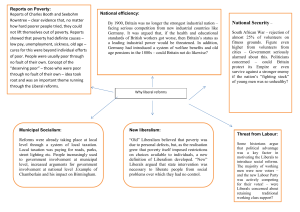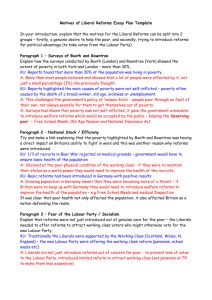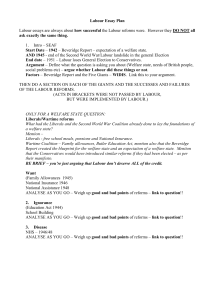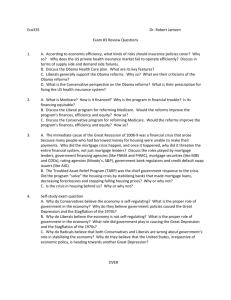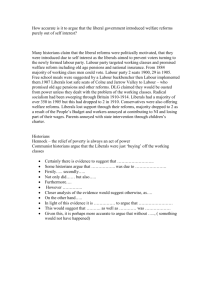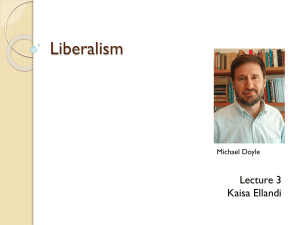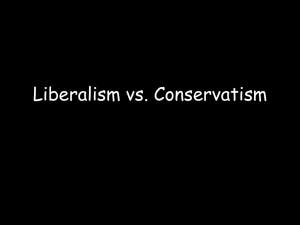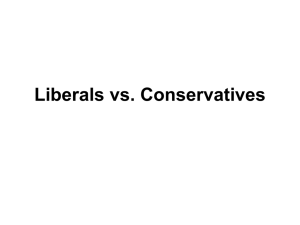kingring notes - why reform
advertisement
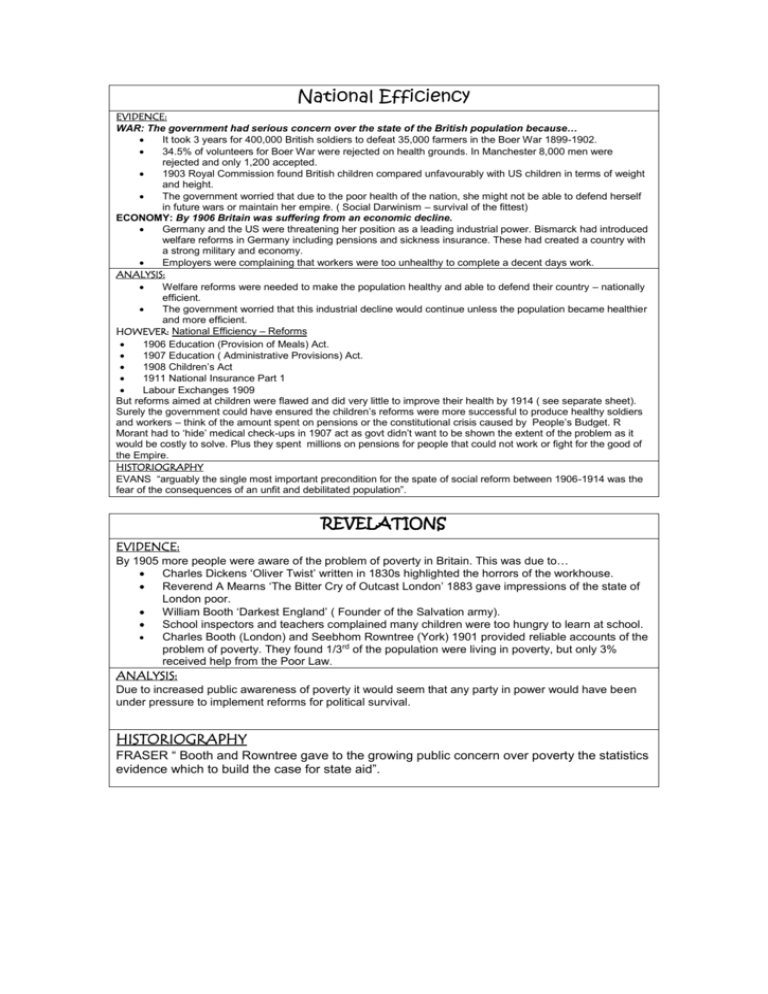
National Efficiency EVIDENCE: WAR: The government had serious concern over the state of the British population because… It took 3 years for 400,000 British soldiers to defeat 35,000 farmers in the Boer War 1899-1902. 34.5% of volunteers for Boer War were rejected on health grounds. In Manchester 8,000 men were rejected and only 1,200 accepted. 1903 Royal Commission found British children compared unfavourably with US children in terms of weight and height. The government worried that due to the poor health of the nation, she might not be able to defend herself in future wars or maintain her empire. ( Social Darwinism – survival of the fittest) ECONOMY: By 1906 Britain was suffering from an economic decline. Germany and the US were threatening her position as a leading industrial power. Bismarck had introduced welfare reforms in Germany including pensions and sickness insurance. These had created a country with a strong military and economy. Employers were complaining that workers were too unhealthy to complete a decent days work. ANALYSIS: Welfare reforms were needed to make the population healthy and able to defend their country – nationally efficient. The government worried that this industrial decline would continue unless the population became healthier and more efficient. HOWEVER: National Efficiency – Reforms 1906 Education (Provision of Meals) Act. 1907 Education ( Administrative Provisions) Act. 1908 Children’s Act 1911 National Insurance Part 1 Labour Exchanges 1909 But reforms aimed at children were flawed and did very little to improve their health by 1914 ( see separate sheet). Surely the government could have ensured the children’s reforms were more successful to produce healthy soldiers and workers – think of the amount spent on pensions or the constitutional crisis caused by People’s Budget. R Morant had to ‘hide’ medical check-ups in 1907 act as govt didn’t want to be shown the extent of the problem as it would be costly to solve. Plus they spent millions on pensions for people that could not work or fight for the good of the Empire. HISTORIOGRAPHY EVANS “arguably the single most important precondition for the spate of social reform between 1906-1914 was the fear of the consequences of an unfit and debilitated population”. REVELATIONS EVIDENCE: By 1905 more people were aware of the problem of poverty in Britain. This was due to… Charles Dickens ‘Oliver Twist’ written in 1830s highlighted the horrors of the workhouse. Reverend A Mearns ‘The Bitter Cry of Outcast London’ 1883 gave impressions of the state of London poor. William Booth ‘Darkest England’ ( Founder of the Salvation army). School inspectors and teachers complained many children were too hungry to learn at school. Charles Booth (London) and Seebhom Rowntree (York) 1901 provided reliable accounts of the problem of poverty. They found 1/3rd of the population were living in poverty, but only 3% received help from the Poor Law. ANALYSIS: Due to increased public awareness of poverty it would seem that any party in power would have been under pressure to implement reforms for political survival. HISTORIOGRAPHY FRASER “ Booth and Rowntree gave to the growing public concern over poverty the statistics evidence which to build the case for state aid”. POWER EVIDENCE: When the Liberals came to power they had a majority of 400. In the elections in 1910 this majority dropped to 2. Labour threatened the Liberals. It promised pensions, action again unemployment and other welfare reforms. Following voting reform from 1890 the majority of voters were working class. Liberals worried that Labour would win working class support and threaten the position of the Liberals. 1900 Labour party formed with 2 seats in parliament, by 1905 election Labour had 29 seats. David Lloyd George recognised the need for welfare reforms for political survival and to maintain working class support. Liberals also faced the problem of trade unionism and radical socialism. Radical Socialism called for the destruction of capitalism. From 1910-14 there was a wave of miners and dockers strikes. Liberals realised welfare reforms could prevent political unrest. Germany had reduced socialism through welfare reforms. ANALYSIS: Labour seemed a direct threat as Free school meals proposed by Labour William Wilson. It received wide support and then the Liberals introduced them. In 1907 the Liberals lost 2 ‘safe’ seats in Jarrow and Colne Valley to Labour. Historian wood argues this persuaded them to introduce pensions the next year. David Lloyd George “we will only be ousted from power if we fail to cope seriously with the conditions of the people”. HOWEVER: 1909 People’s Budget taxed the rich, suggesting Liberals seemed willing to lose upper class support in favour of keeping working class support away from Labour. Fear of Conservatives? Especially as Liberal majority had dropped to 2 in 1910 and Conservatives had mentioned welfare reforms. Conservatives traditionally had upper class support, yet the Liberals seemed willing to risk this support by implementing reforms from the pockets of the rich. Maybe it wasn’t just self interest? Plus the Liberals actually lost support from the workers. They objected to paying out money for National Insurance. Pugh argues that many parents resented the reforms dealing with children ‘as an infringement of their role’. HISTORIOGRAPHY Historian Duncan Tanner believes that “ very little legislation stemmed directly from Labour pressure” Morrison argues that the Liberals were more afraid of the Conservatives. NEW LIBERALISM EVIDENCE: Before 1905 many Liberals believed in ‘Laissez-faire’. A new groups in the party believed it was the duty of the government to take action to help Britain’s poorer citizens. This group was called ‘ new liberals’. It included David Lloyd George and Winston Churchill. Churchill “ I see little glory in an empire which can rule the waves but it unable to flush its own sewers” Churchill aimed “to draw a line below which we will not allow people to live and labour”. Liberals wanted to help the deserving poor out of social conscience but they recognised the political advantages it could bring too. ANALYSIS: Most obvious is the 1909 People’s Budget which caused a constitutional crisis. Cemented the principle that the better off should be taxed to help the poorer citizens of Britain. Lost Liberals some upper class support. 1907 Medical Check-ups was pushed through by R Morant a public servant. 1908 Old Age Pensions, non-contributory – rescuing some of the most vulnerable in society (unlikely to help with national efficiency). 1908 Children’s Charter. 1909 Trade Boards Act The number of welfare reforms increased after 1908 after David Lloyd George and Churchill were brought into the government. HISTORIOGRAPHY Most historians, for example Morrison, Wood and Martell acknowledge the importance of these men (DLG & WC) in the introduction of the reforms through a genuine social conscience. WHY DID THE LIBERALS INTRODUCE SOCIAL REFORMS? WHY DID THE LIBERALS INTRODUCE SOCIAL REFORMS?
